Dignity and Respect: Ethical Concepts and Communication in Healthcare
VerifiedAdded on 2023/06/18
|11
|3844
|213
Report
AI Summary
This report delves into the ethical considerations and strategies essential for fostering dignity and respect in healthcare settings, particularly within the context of a case study involving Mrs. Wang, a patient in the final stages of lung cancer. It emphasizes the importance of respecting patient autonomy, ensuring confidentiality, and overcoming linguistic and cultural barriers to facilitate effective communication. The report highlights the ethical principles of non-maleficence, justice, and the necessity of informed consent in healthcare decisions. It also addresses the role of healthcare professionals in advocating for patients' rights and ensuring their emotional and mental well-being. Furthermore, the document underscores the significance of utilizing effective communication and interpersonal skills to build trust with patients, involve family members in care planning, and provide culturally sensitive palliative care. The analysis covers the challenges posed by language barriers and cultural differences, advocating for the use of interpreters and holistic care approaches to enhance patient confidence and improve the overall quality of care.
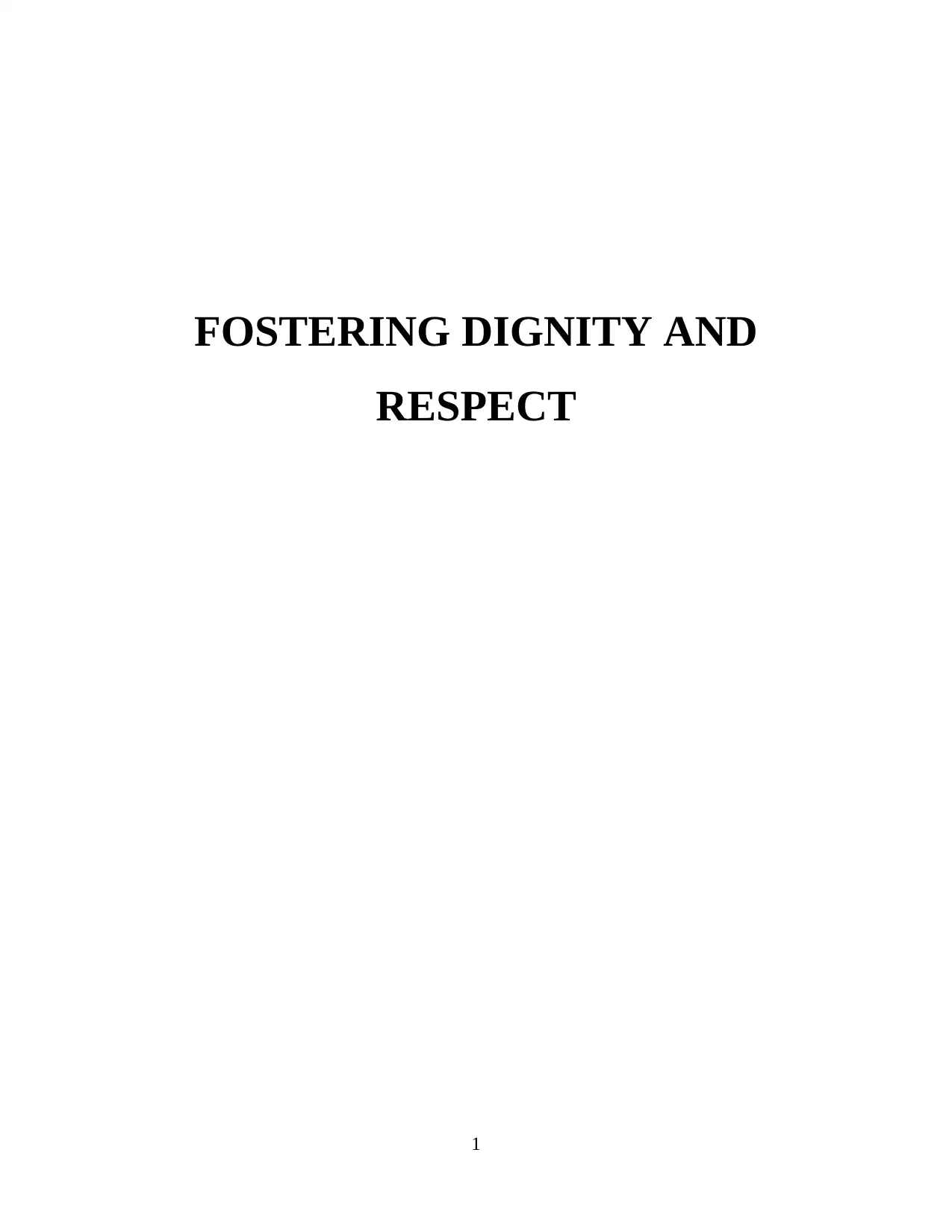
FOSTERING DIGNITY AND
RESPECT
1
RESPECT
1
Paraphrase This Document
Need a fresh take? Get an instant paraphrase of this document with our AI Paraphraser
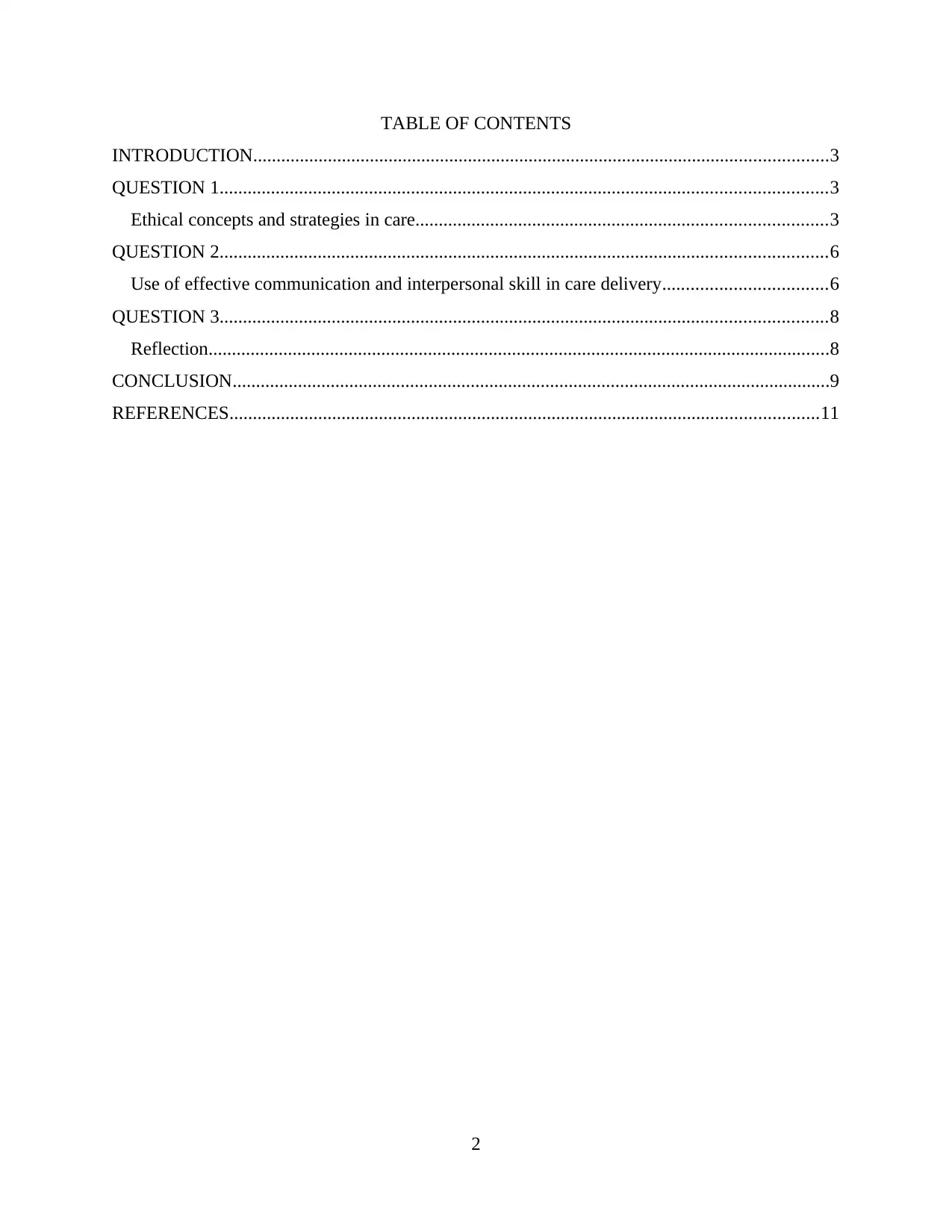
TABLE OF CONTENTS
INTRODUCTION...........................................................................................................................3
QUESTION 1..................................................................................................................................3
Ethical concepts and strategies in care........................................................................................3
QUESTION 2..................................................................................................................................6
Use of effective communication and interpersonal skill in care delivery...................................6
QUESTION 3..................................................................................................................................8
Reflection.....................................................................................................................................8
CONCLUSION................................................................................................................................9
REFERENCES..............................................................................................................................11
2
INTRODUCTION...........................................................................................................................3
QUESTION 1..................................................................................................................................3
Ethical concepts and strategies in care........................................................................................3
QUESTION 2..................................................................................................................................6
Use of effective communication and interpersonal skill in care delivery...................................6
QUESTION 3..................................................................................................................................8
Reflection.....................................................................................................................................8
CONCLUSION................................................................................................................................9
REFERENCES..............................................................................................................................11
2
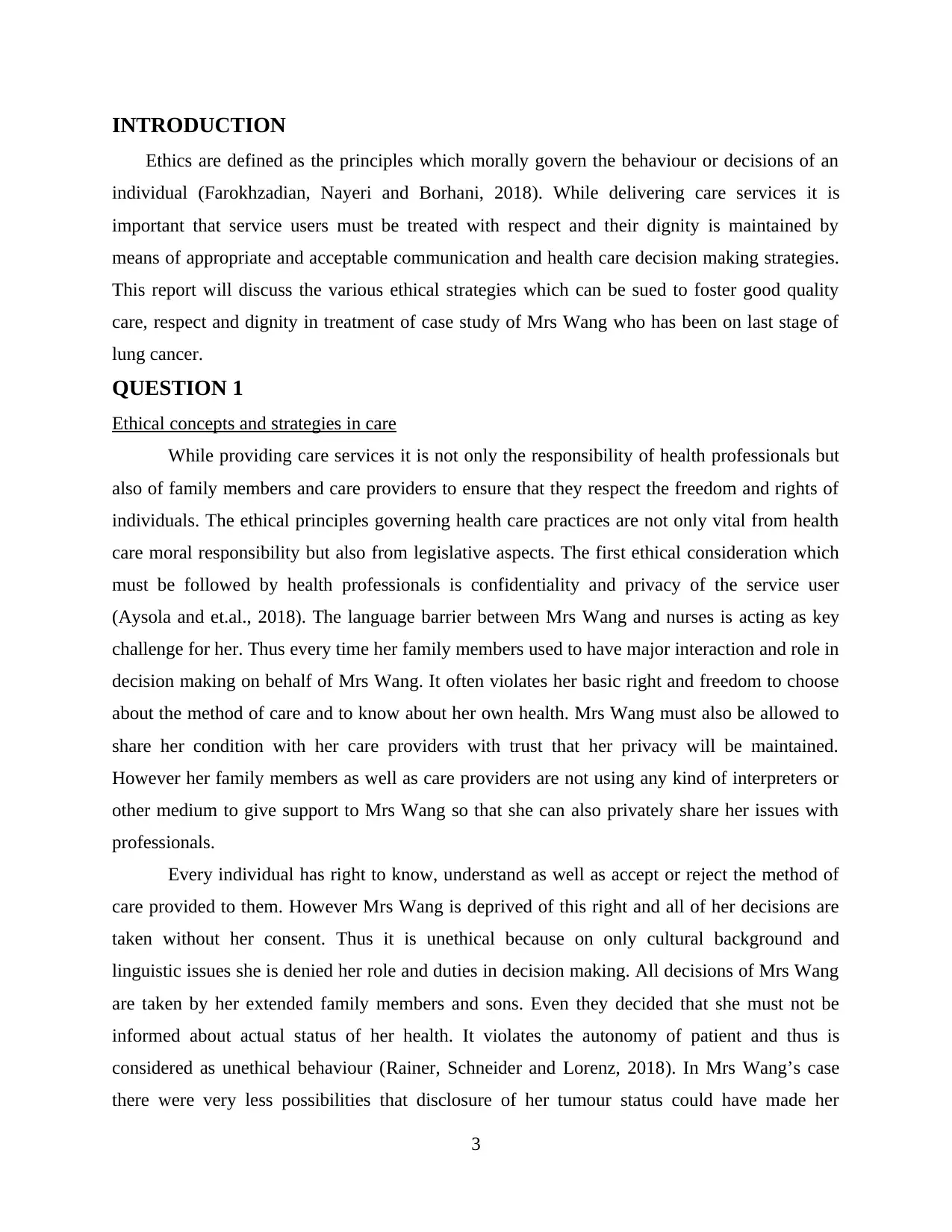
INTRODUCTION
Ethics are defined as the principles which morally govern the behaviour or decisions of an
individual (Farokhzadian, Nayeri and Borhani, 2018). While delivering care services it is
important that service users must be treated with respect and their dignity is maintained by
means of appropriate and acceptable communication and health care decision making strategies.
This report will discuss the various ethical strategies which can be sued to foster good quality
care, respect and dignity in treatment of case study of Mrs Wang who has been on last stage of
lung cancer.
QUESTION 1
Ethical concepts and strategies in care
While providing care services it is not only the responsibility of health professionals but
also of family members and care providers to ensure that they respect the freedom and rights of
individuals. The ethical principles governing health care practices are not only vital from health
care moral responsibility but also from legislative aspects. The first ethical consideration which
must be followed by health professionals is confidentiality and privacy of the service user
(Aysola and et.al., 2018). The language barrier between Mrs Wang and nurses is acting as key
challenge for her. Thus every time her family members used to have major interaction and role in
decision making on behalf of Mrs Wang. It often violates her basic right and freedom to choose
about the method of care and to know about her own health. Mrs Wang must also be allowed to
share her condition with her care providers with trust that her privacy will be maintained.
However her family members as well as care providers are not using any kind of interpreters or
other medium to give support to Mrs Wang so that she can also privately share her issues with
professionals.
Every individual has right to know, understand as well as accept or reject the method of
care provided to them. However Mrs Wang is deprived of this right and all of her decisions are
taken without her consent. Thus it is unethical because on only cultural background and
linguistic issues she is denied her role and duties in decision making. All decisions of Mrs Wang
are taken by her extended family members and sons. Even they decided that she must not be
informed about actual status of her health. It violates the autonomy of patient and thus is
considered as unethical behaviour (Rainer, Schneider and Lorenz, 2018). In Mrs Wang’s case
there were very less possibilities that disclosure of her tumour status could have made her
3
Ethics are defined as the principles which morally govern the behaviour or decisions of an
individual (Farokhzadian, Nayeri and Borhani, 2018). While delivering care services it is
important that service users must be treated with respect and their dignity is maintained by
means of appropriate and acceptable communication and health care decision making strategies.
This report will discuss the various ethical strategies which can be sued to foster good quality
care, respect and dignity in treatment of case study of Mrs Wang who has been on last stage of
lung cancer.
QUESTION 1
Ethical concepts and strategies in care
While providing care services it is not only the responsibility of health professionals but
also of family members and care providers to ensure that they respect the freedom and rights of
individuals. The ethical principles governing health care practices are not only vital from health
care moral responsibility but also from legislative aspects. The first ethical consideration which
must be followed by health professionals is confidentiality and privacy of the service user
(Aysola and et.al., 2018). The language barrier between Mrs Wang and nurses is acting as key
challenge for her. Thus every time her family members used to have major interaction and role in
decision making on behalf of Mrs Wang. It often violates her basic right and freedom to choose
about the method of care and to know about her own health. Mrs Wang must also be allowed to
share her condition with her care providers with trust that her privacy will be maintained.
However her family members as well as care providers are not using any kind of interpreters or
other medium to give support to Mrs Wang so that she can also privately share her issues with
professionals.
Every individual has right to know, understand as well as accept or reject the method of
care provided to them. However Mrs Wang is deprived of this right and all of her decisions are
taken without her consent. Thus it is unethical because on only cultural background and
linguistic issues she is denied her role and duties in decision making. All decisions of Mrs Wang
are taken by her extended family members and sons. Even they decided that she must not be
informed about actual status of her health. It violates the autonomy of patient and thus is
considered as unethical behaviour (Rainer, Schneider and Lorenz, 2018). In Mrs Wang’s case
there were very less possibilities that disclosure of her tumour status could have made her
3
⊘ This is a preview!⊘
Do you want full access?
Subscribe today to unlock all pages.

Trusted by 1+ million students worldwide
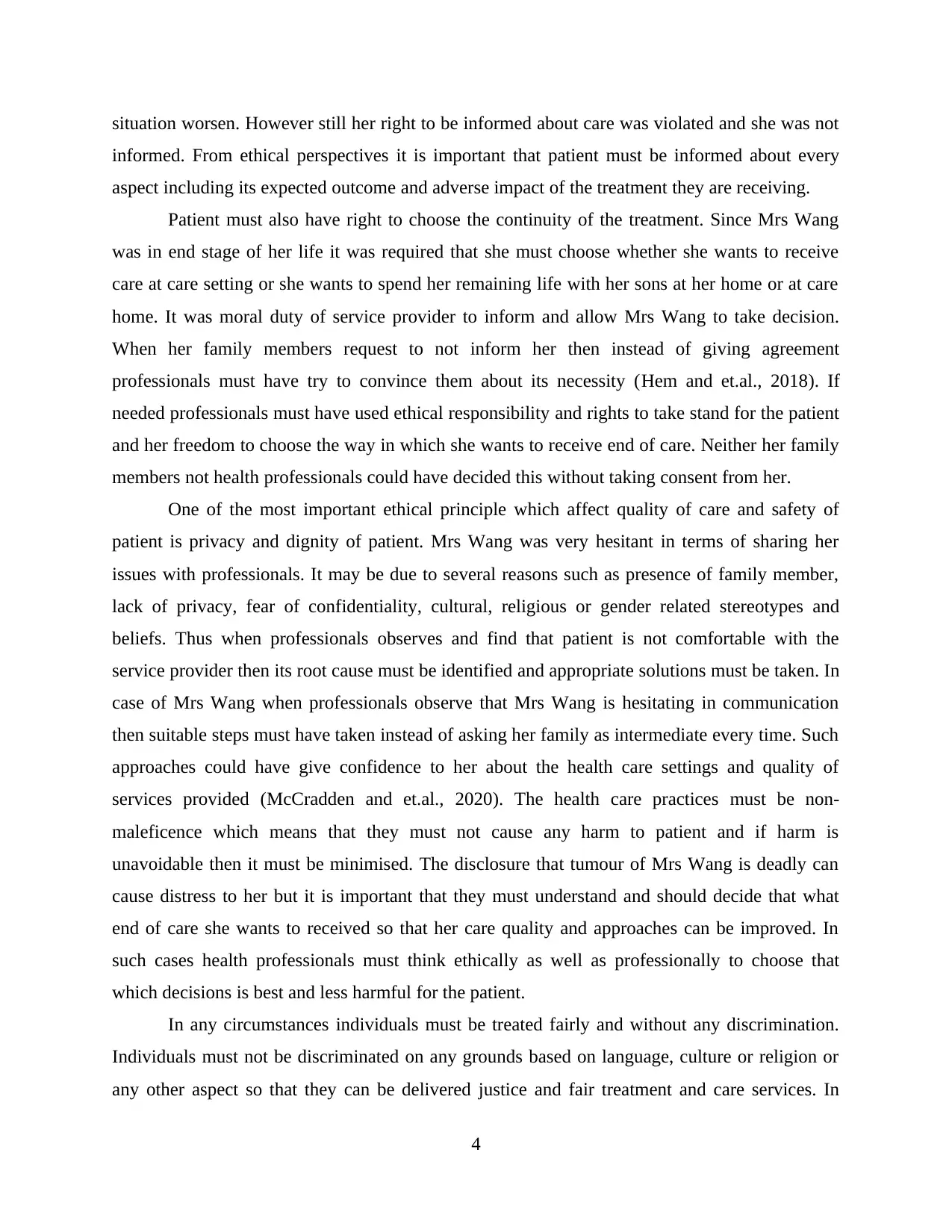
situation worsen. However still her right to be informed about care was violated and she was not
informed. From ethical perspectives it is important that patient must be informed about every
aspect including its expected outcome and adverse impact of the treatment they are receiving.
Patient must also have right to choose the continuity of the treatment. Since Mrs Wang
was in end stage of her life it was required that she must choose whether she wants to receive
care at care setting or she wants to spend her remaining life with her sons at her home or at care
home. It was moral duty of service provider to inform and allow Mrs Wang to take decision.
When her family members request to not inform her then instead of giving agreement
professionals must have try to convince them about its necessity (Hem and et.al., 2018). If
needed professionals must have used ethical responsibility and rights to take stand for the patient
and her freedom to choose the way in which she wants to receive end of care. Neither her family
members not health professionals could have decided this without taking consent from her.
One of the most important ethical principle which affect quality of care and safety of
patient is privacy and dignity of patient. Mrs Wang was very hesitant in terms of sharing her
issues with professionals. It may be due to several reasons such as presence of family member,
lack of privacy, fear of confidentiality, cultural, religious or gender related stereotypes and
beliefs. Thus when professionals observes and find that patient is not comfortable with the
service provider then its root cause must be identified and appropriate solutions must be taken. In
case of Mrs Wang when professionals observe that Mrs Wang is hesitating in communication
then suitable steps must have taken instead of asking her family as intermediate every time. Such
approaches could have give confidence to her about the health care settings and quality of
services provided (McCradden and et.al., 2020). The health care practices must be non-
maleficence which means that they must not cause any harm to patient and if harm is
unavoidable then it must be minimised. The disclosure that tumour of Mrs Wang is deadly can
cause distress to her but it is important that they must understand and should decide that what
end of care she wants to received so that her care quality and approaches can be improved. In
such cases health professionals must think ethically as well as professionally to choose that
which decisions is best and less harmful for the patient.
In any circumstances individuals must be treated fairly and without any discrimination.
Individuals must not be discriminated on any grounds based on language, culture or religion or
any other aspect so that they can be delivered justice and fair treatment and care services. In
4
informed. From ethical perspectives it is important that patient must be informed about every
aspect including its expected outcome and adverse impact of the treatment they are receiving.
Patient must also have right to choose the continuity of the treatment. Since Mrs Wang
was in end stage of her life it was required that she must choose whether she wants to receive
care at care setting or she wants to spend her remaining life with her sons at her home or at care
home. It was moral duty of service provider to inform and allow Mrs Wang to take decision.
When her family members request to not inform her then instead of giving agreement
professionals must have try to convince them about its necessity (Hem and et.al., 2018). If
needed professionals must have used ethical responsibility and rights to take stand for the patient
and her freedom to choose the way in which she wants to receive end of care. Neither her family
members not health professionals could have decided this without taking consent from her.
One of the most important ethical principle which affect quality of care and safety of
patient is privacy and dignity of patient. Mrs Wang was very hesitant in terms of sharing her
issues with professionals. It may be due to several reasons such as presence of family member,
lack of privacy, fear of confidentiality, cultural, religious or gender related stereotypes and
beliefs. Thus when professionals observes and find that patient is not comfortable with the
service provider then its root cause must be identified and appropriate solutions must be taken. In
case of Mrs Wang when professionals observe that Mrs Wang is hesitating in communication
then suitable steps must have taken instead of asking her family as intermediate every time. Such
approaches could have give confidence to her about the health care settings and quality of
services provided (McCradden and et.al., 2020). The health care practices must be non-
maleficence which means that they must not cause any harm to patient and if harm is
unavoidable then it must be minimised. The disclosure that tumour of Mrs Wang is deadly can
cause distress to her but it is important that they must understand and should decide that what
end of care she wants to received so that her care quality and approaches can be improved. In
such cases health professionals must think ethically as well as professionally to choose that
which decisions is best and less harmful for the patient.
In any circumstances individuals must be treated fairly and without any discrimination.
Individuals must not be discriminated on any grounds based on language, culture or religion or
any other aspect so that they can be delivered justice and fair treatment and care services. In
4
Paraphrase This Document
Need a fresh take? Get an instant paraphrase of this document with our AI Paraphraser
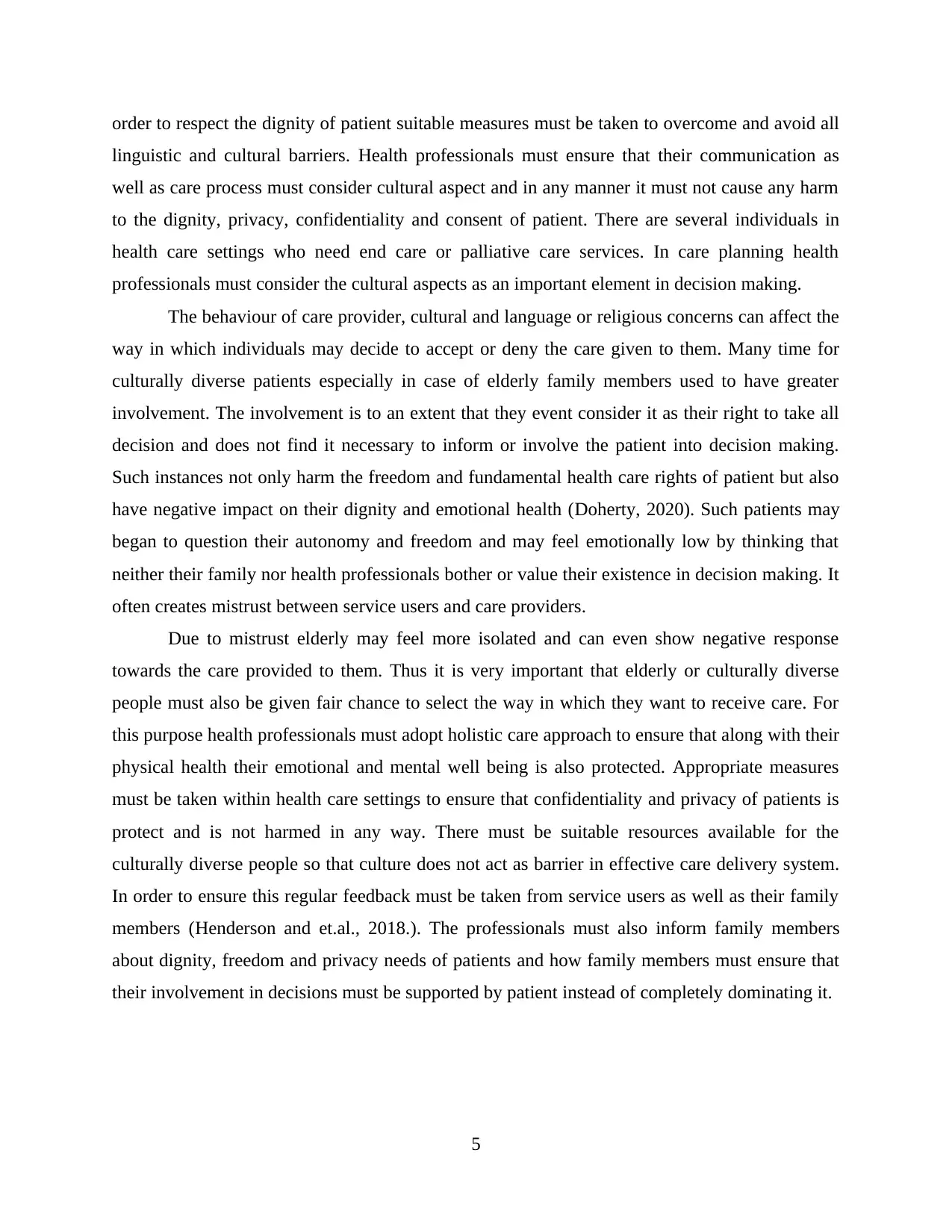
order to respect the dignity of patient suitable measures must be taken to overcome and avoid all
linguistic and cultural barriers. Health professionals must ensure that their communication as
well as care process must consider cultural aspect and in any manner it must not cause any harm
to the dignity, privacy, confidentiality and consent of patient. There are several individuals in
health care settings who need end care or palliative care services. In care planning health
professionals must consider the cultural aspects as an important element in decision making.
The behaviour of care provider, cultural and language or religious concerns can affect the
way in which individuals may decide to accept or deny the care given to them. Many time for
culturally diverse patients especially in case of elderly family members used to have greater
involvement. The involvement is to an extent that they event consider it as their right to take all
decision and does not find it necessary to inform or involve the patient into decision making.
Such instances not only harm the freedom and fundamental health care rights of patient but also
have negative impact on their dignity and emotional health (Doherty, 2020). Such patients may
began to question their autonomy and freedom and may feel emotionally low by thinking that
neither their family nor health professionals bother or value their existence in decision making. It
often creates mistrust between service users and care providers.
Due to mistrust elderly may feel more isolated and can even show negative response
towards the care provided to them. Thus it is very important that elderly or culturally diverse
people must also be given fair chance to select the way in which they want to receive care. For
this purpose health professionals must adopt holistic care approach to ensure that along with their
physical health their emotional and mental well being is also protected. Appropriate measures
must be taken within health care settings to ensure that confidentiality and privacy of patients is
protect and is not harmed in any way. There must be suitable resources available for the
culturally diverse people so that culture does not act as barrier in effective care delivery system.
In order to ensure this regular feedback must be taken from service users as well as their family
members (Henderson and et.al., 2018.). The professionals must also inform family members
about dignity, freedom and privacy needs of patients and how family members must ensure that
their involvement in decisions must be supported by patient instead of completely dominating it.
5
linguistic and cultural barriers. Health professionals must ensure that their communication as
well as care process must consider cultural aspect and in any manner it must not cause any harm
to the dignity, privacy, confidentiality and consent of patient. There are several individuals in
health care settings who need end care or palliative care services. In care planning health
professionals must consider the cultural aspects as an important element in decision making.
The behaviour of care provider, cultural and language or religious concerns can affect the
way in which individuals may decide to accept or deny the care given to them. Many time for
culturally diverse patients especially in case of elderly family members used to have greater
involvement. The involvement is to an extent that they event consider it as their right to take all
decision and does not find it necessary to inform or involve the patient into decision making.
Such instances not only harm the freedom and fundamental health care rights of patient but also
have negative impact on their dignity and emotional health (Doherty, 2020). Such patients may
began to question their autonomy and freedom and may feel emotionally low by thinking that
neither their family nor health professionals bother or value their existence in decision making. It
often creates mistrust between service users and care providers.
Due to mistrust elderly may feel more isolated and can even show negative response
towards the care provided to them. Thus it is very important that elderly or culturally diverse
people must also be given fair chance to select the way in which they want to receive care. For
this purpose health professionals must adopt holistic care approach to ensure that along with their
physical health their emotional and mental well being is also protected. Appropriate measures
must be taken within health care settings to ensure that confidentiality and privacy of patients is
protect and is not harmed in any way. There must be suitable resources available for the
culturally diverse people so that culture does not act as barrier in effective care delivery system.
In order to ensure this regular feedback must be taken from service users as well as their family
members (Henderson and et.al., 2018.). The professionals must also inform family members
about dignity, freedom and privacy needs of patients and how family members must ensure that
their involvement in decisions must be supported by patient instead of completely dominating it.
5
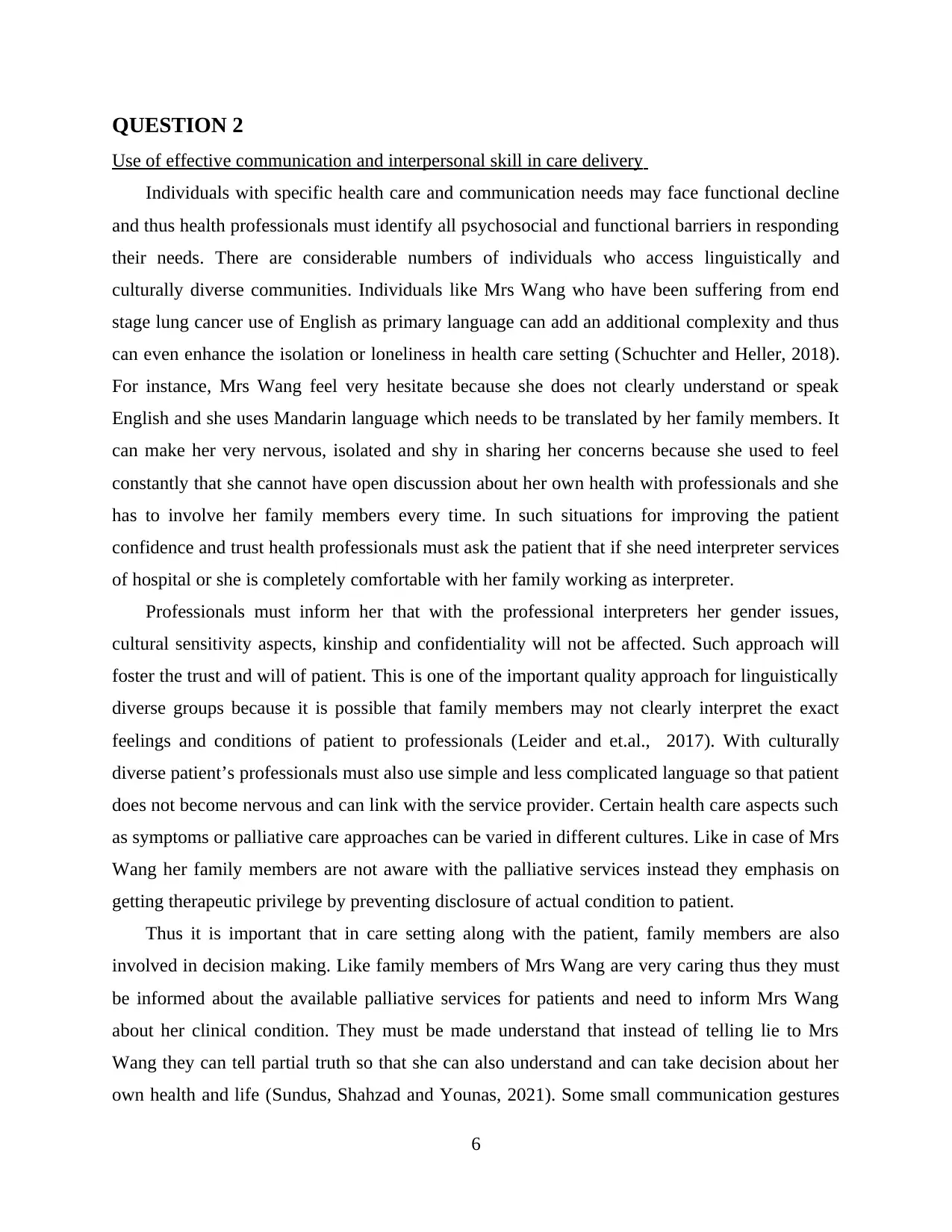
QUESTION 2
Use of effective communication and interpersonal skill in care delivery
Individuals with specific health care and communication needs may face functional decline
and thus health professionals must identify all psychosocial and functional barriers in responding
their needs. There are considerable numbers of individuals who access linguistically and
culturally diverse communities. Individuals like Mrs Wang who have been suffering from end
stage lung cancer use of English as primary language can add an additional complexity and thus
can even enhance the isolation or loneliness in health care setting (Schuchter and Heller, 2018).
For instance, Mrs Wang feel very hesitate because she does not clearly understand or speak
English and she uses Mandarin language which needs to be translated by her family members. It
can make her very nervous, isolated and shy in sharing her concerns because she used to feel
constantly that she cannot have open discussion about her own health with professionals and she
has to involve her family members every time. In such situations for improving the patient
confidence and trust health professionals must ask the patient that if she need interpreter services
of hospital or she is completely comfortable with her family working as interpreter.
Professionals must inform her that with the professional interpreters her gender issues,
cultural sensitivity aspects, kinship and confidentiality will not be affected. Such approach will
foster the trust and will of patient. This is one of the important quality approach for linguistically
diverse groups because it is possible that family members may not clearly interpret the exact
feelings and conditions of patient to professionals (Leider and et.al., 2017). With culturally
diverse patient’s professionals must also use simple and less complicated language so that patient
does not become nervous and can link with the service provider. Certain health care aspects such
as symptoms or palliative care approaches can be varied in different cultures. Like in case of Mrs
Wang her family members are not aware with the palliative services instead they emphasis on
getting therapeutic privilege by preventing disclosure of actual condition to patient.
Thus it is important that in care setting along with the patient, family members are also
involved in decision making. Like family members of Mrs Wang are very caring thus they must
be informed about the available palliative services for patients and need to inform Mrs Wang
about her clinical condition. They must be made understand that instead of telling lie to Mrs
Wang they can tell partial truth so that she can also understand and can take decision about her
own health and life (Sundus, Shahzad and Younas, 2021). Some small communication gestures
6
Use of effective communication and interpersonal skill in care delivery
Individuals with specific health care and communication needs may face functional decline
and thus health professionals must identify all psychosocial and functional barriers in responding
their needs. There are considerable numbers of individuals who access linguistically and
culturally diverse communities. Individuals like Mrs Wang who have been suffering from end
stage lung cancer use of English as primary language can add an additional complexity and thus
can even enhance the isolation or loneliness in health care setting (Schuchter and Heller, 2018).
For instance, Mrs Wang feel very hesitate because she does not clearly understand or speak
English and she uses Mandarin language which needs to be translated by her family members. It
can make her very nervous, isolated and shy in sharing her concerns because she used to feel
constantly that she cannot have open discussion about her own health with professionals and she
has to involve her family members every time. In such situations for improving the patient
confidence and trust health professionals must ask the patient that if she need interpreter services
of hospital or she is completely comfortable with her family working as interpreter.
Professionals must inform her that with the professional interpreters her gender issues,
cultural sensitivity aspects, kinship and confidentiality will not be affected. Such approach will
foster the trust and will of patient. This is one of the important quality approach for linguistically
diverse groups because it is possible that family members may not clearly interpret the exact
feelings and conditions of patient to professionals (Leider and et.al., 2017). With culturally
diverse patient’s professionals must also use simple and less complicated language so that patient
does not become nervous and can link with the service provider. Certain health care aspects such
as symptoms or palliative care approaches can be varied in different cultures. Like in case of Mrs
Wang her family members are not aware with the palliative services instead they emphasis on
getting therapeutic privilege by preventing disclosure of actual condition to patient.
Thus it is important that in care setting along with the patient, family members are also
involved in decision making. Like family members of Mrs Wang are very caring thus they must
be informed about the available palliative services for patients and need to inform Mrs Wang
about her clinical condition. They must be made understand that instead of telling lie to Mrs
Wang they can tell partial truth so that she can also understand and can take decision about her
own health and life (Sundus, Shahzad and Younas, 2021). Some small communication gestures
6
⊘ This is a preview!⊘
Do you want full access?
Subscribe today to unlock all pages.

Trusted by 1+ million students worldwide
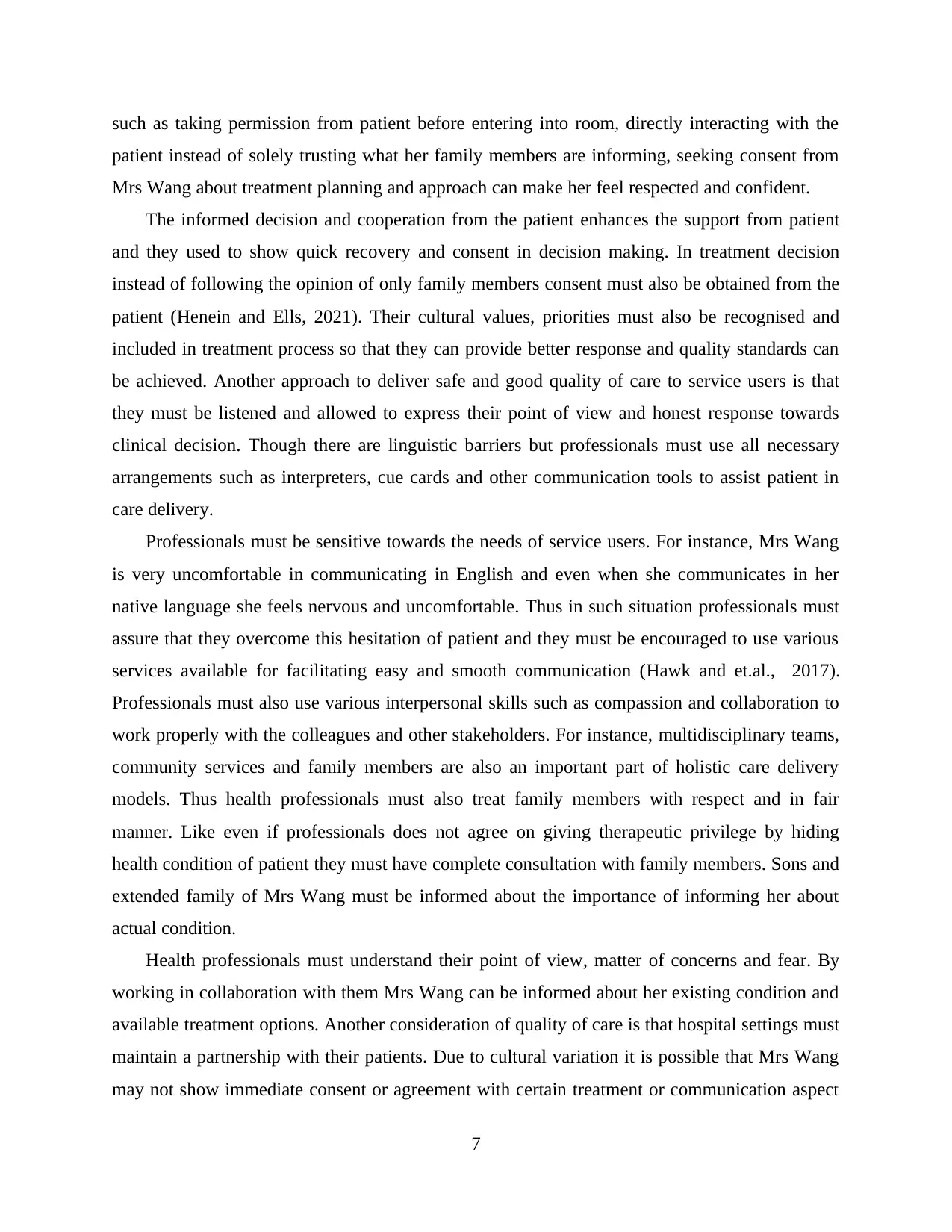
such as taking permission from patient before entering into room, directly interacting with the
patient instead of solely trusting what her family members are informing, seeking consent from
Mrs Wang about treatment planning and approach can make her feel respected and confident.
The informed decision and cooperation from the patient enhances the support from patient
and they used to show quick recovery and consent in decision making. In treatment decision
instead of following the opinion of only family members consent must also be obtained from the
patient (Henein and Ells, 2021). Their cultural values, priorities must also be recognised and
included in treatment process so that they can provide better response and quality standards can
be achieved. Another approach to deliver safe and good quality of care to service users is that
they must be listened and allowed to express their point of view and honest response towards
clinical decision. Though there are linguistic barriers but professionals must use all necessary
arrangements such as interpreters, cue cards and other communication tools to assist patient in
care delivery.
Professionals must be sensitive towards the needs of service users. For instance, Mrs Wang
is very uncomfortable in communicating in English and even when she communicates in her
native language she feels nervous and uncomfortable. Thus in such situation professionals must
assure that they overcome this hesitation of patient and they must be encouraged to use various
services available for facilitating easy and smooth communication (Hawk and et.al., 2017).
Professionals must also use various interpersonal skills such as compassion and collaboration to
work properly with the colleagues and other stakeholders. For instance, multidisciplinary teams,
community services and family members are also an important part of holistic care delivery
models. Thus health professionals must also treat family members with respect and in fair
manner. Like even if professionals does not agree on giving therapeutic privilege by hiding
health condition of patient they must have complete consultation with family members. Sons and
extended family of Mrs Wang must be informed about the importance of informing her about
actual condition.
Health professionals must understand their point of view, matter of concerns and fear. By
working in collaboration with them Mrs Wang can be informed about her existing condition and
available treatment options. Another consideration of quality of care is that hospital settings must
maintain a partnership with their patients. Due to cultural variation it is possible that Mrs Wang
may not show immediate consent or agreement with certain treatment or communication aspect
7
patient instead of solely trusting what her family members are informing, seeking consent from
Mrs Wang about treatment planning and approach can make her feel respected and confident.
The informed decision and cooperation from the patient enhances the support from patient
and they used to show quick recovery and consent in decision making. In treatment decision
instead of following the opinion of only family members consent must also be obtained from the
patient (Henein and Ells, 2021). Their cultural values, priorities must also be recognised and
included in treatment process so that they can provide better response and quality standards can
be achieved. Another approach to deliver safe and good quality of care to service users is that
they must be listened and allowed to express their point of view and honest response towards
clinical decision. Though there are linguistic barriers but professionals must use all necessary
arrangements such as interpreters, cue cards and other communication tools to assist patient in
care delivery.
Professionals must be sensitive towards the needs of service users. For instance, Mrs Wang
is very uncomfortable in communicating in English and even when she communicates in her
native language she feels nervous and uncomfortable. Thus in such situation professionals must
assure that they overcome this hesitation of patient and they must be encouraged to use various
services available for facilitating easy and smooth communication (Hawk and et.al., 2017).
Professionals must also use various interpersonal skills such as compassion and collaboration to
work properly with the colleagues and other stakeholders. For instance, multidisciplinary teams,
community services and family members are also an important part of holistic care delivery
models. Thus health professionals must also treat family members with respect and in fair
manner. Like even if professionals does not agree on giving therapeutic privilege by hiding
health condition of patient they must have complete consultation with family members. Sons and
extended family of Mrs Wang must be informed about the importance of informing her about
actual condition.
Health professionals must understand their point of view, matter of concerns and fear. By
working in collaboration with them Mrs Wang can be informed about her existing condition and
available treatment options. Another consideration of quality of care is that hospital settings must
maintain a partnership with their patients. Due to cultural variation it is possible that Mrs Wang
may not show immediate consent or agreement with certain treatment or communication aspect
7
Paraphrase This Document
Need a fresh take? Get an instant paraphrase of this document with our AI Paraphraser
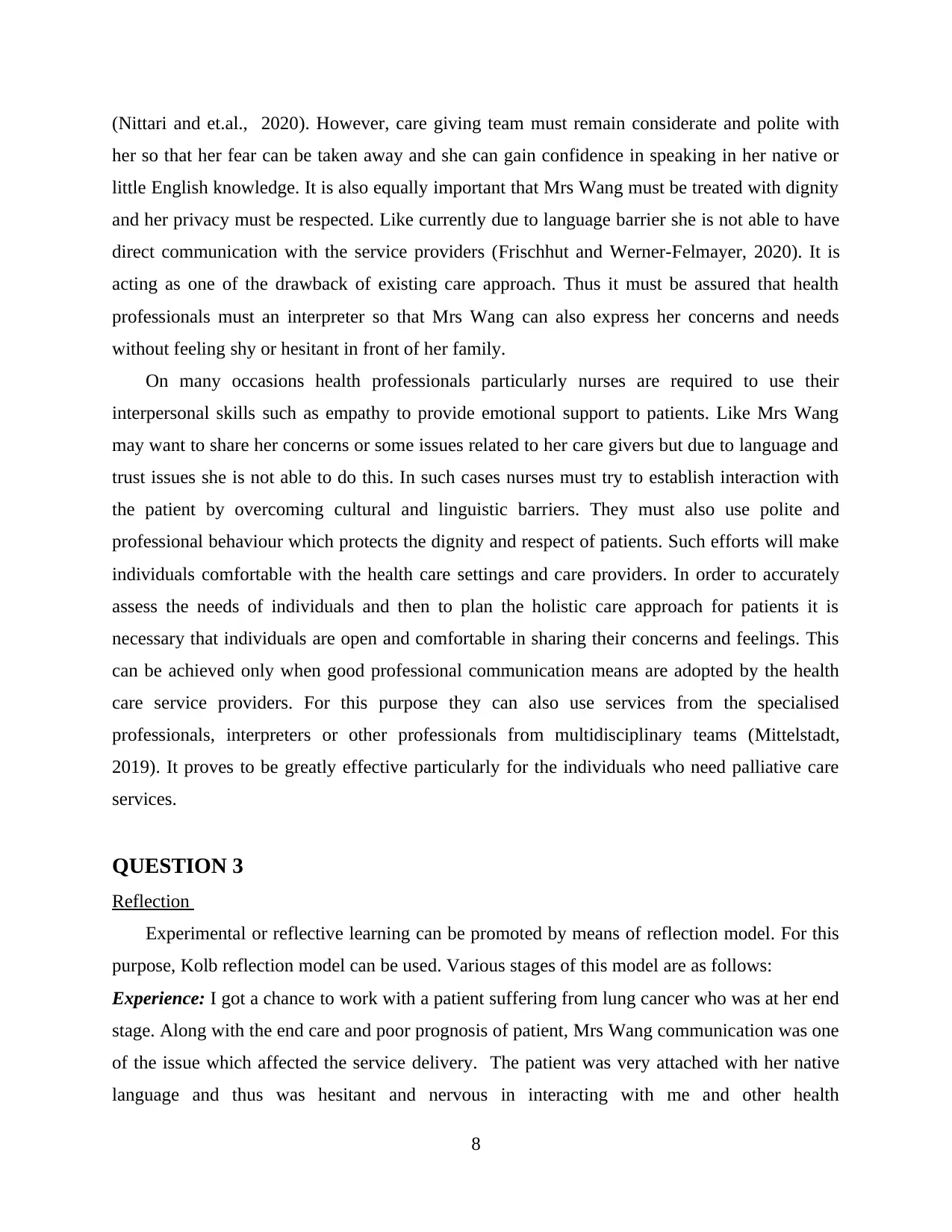
(Nittari and et.al., 2020). However, care giving team must remain considerate and polite with
her so that her fear can be taken away and she can gain confidence in speaking in her native or
little English knowledge. It is also equally important that Mrs Wang must be treated with dignity
and her privacy must be respected. Like currently due to language barrier she is not able to have
direct communication with the service providers (Frischhut and Werner-Felmayer, 2020). It is
acting as one of the drawback of existing care approach. Thus it must be assured that health
professionals must an interpreter so that Mrs Wang can also express her concerns and needs
without feeling shy or hesitant in front of her family.
On many occasions health professionals particularly nurses are required to use their
interpersonal skills such as empathy to provide emotional support to patients. Like Mrs Wang
may want to share her concerns or some issues related to her care givers but due to language and
trust issues she is not able to do this. In such cases nurses must try to establish interaction with
the patient by overcoming cultural and linguistic barriers. They must also use polite and
professional behaviour which protects the dignity and respect of patients. Such efforts will make
individuals comfortable with the health care settings and care providers. In order to accurately
assess the needs of individuals and then to plan the holistic care approach for patients it is
necessary that individuals are open and comfortable in sharing their concerns and feelings. This
can be achieved only when good professional communication means are adopted by the health
care service providers. For this purpose they can also use services from the specialised
professionals, interpreters or other professionals from multidisciplinary teams (Mittelstadt,
2019). It proves to be greatly effective particularly for the individuals who need palliative care
services.
QUESTION 3
Reflection
Experimental or reflective learning can be promoted by means of reflection model. For this
purpose, Kolb reflection model can be used. Various stages of this model are as follows:
Experience: I got a chance to work with a patient suffering from lung cancer who was at her end
stage. Along with the end care and poor prognosis of patient, Mrs Wang communication was one
of the issue which affected the service delivery. The patient was very attached with her native
language and thus was hesitant and nervous in interacting with me and other health
8
her so that her fear can be taken away and she can gain confidence in speaking in her native or
little English knowledge. It is also equally important that Mrs Wang must be treated with dignity
and her privacy must be respected. Like currently due to language barrier she is not able to have
direct communication with the service providers (Frischhut and Werner-Felmayer, 2020). It is
acting as one of the drawback of existing care approach. Thus it must be assured that health
professionals must an interpreter so that Mrs Wang can also express her concerns and needs
without feeling shy or hesitant in front of her family.
On many occasions health professionals particularly nurses are required to use their
interpersonal skills such as empathy to provide emotional support to patients. Like Mrs Wang
may want to share her concerns or some issues related to her care givers but due to language and
trust issues she is not able to do this. In such cases nurses must try to establish interaction with
the patient by overcoming cultural and linguistic barriers. They must also use polite and
professional behaviour which protects the dignity and respect of patients. Such efforts will make
individuals comfortable with the health care settings and care providers. In order to accurately
assess the needs of individuals and then to plan the holistic care approach for patients it is
necessary that individuals are open and comfortable in sharing their concerns and feelings. This
can be achieved only when good professional communication means are adopted by the health
care service providers. For this purpose they can also use services from the specialised
professionals, interpreters or other professionals from multidisciplinary teams (Mittelstadt,
2019). It proves to be greatly effective particularly for the individuals who need palliative care
services.
QUESTION 3
Reflection
Experimental or reflective learning can be promoted by means of reflection model. For this
purpose, Kolb reflection model can be used. Various stages of this model are as follows:
Experience: I got a chance to work with a patient suffering from lung cancer who was at her end
stage. Along with the end care and poor prognosis of patient, Mrs Wang communication was one
of the issue which affected the service delivery. The patient was very attached with her native
language and thus was hesitant and nervous in interacting with me and other health
8
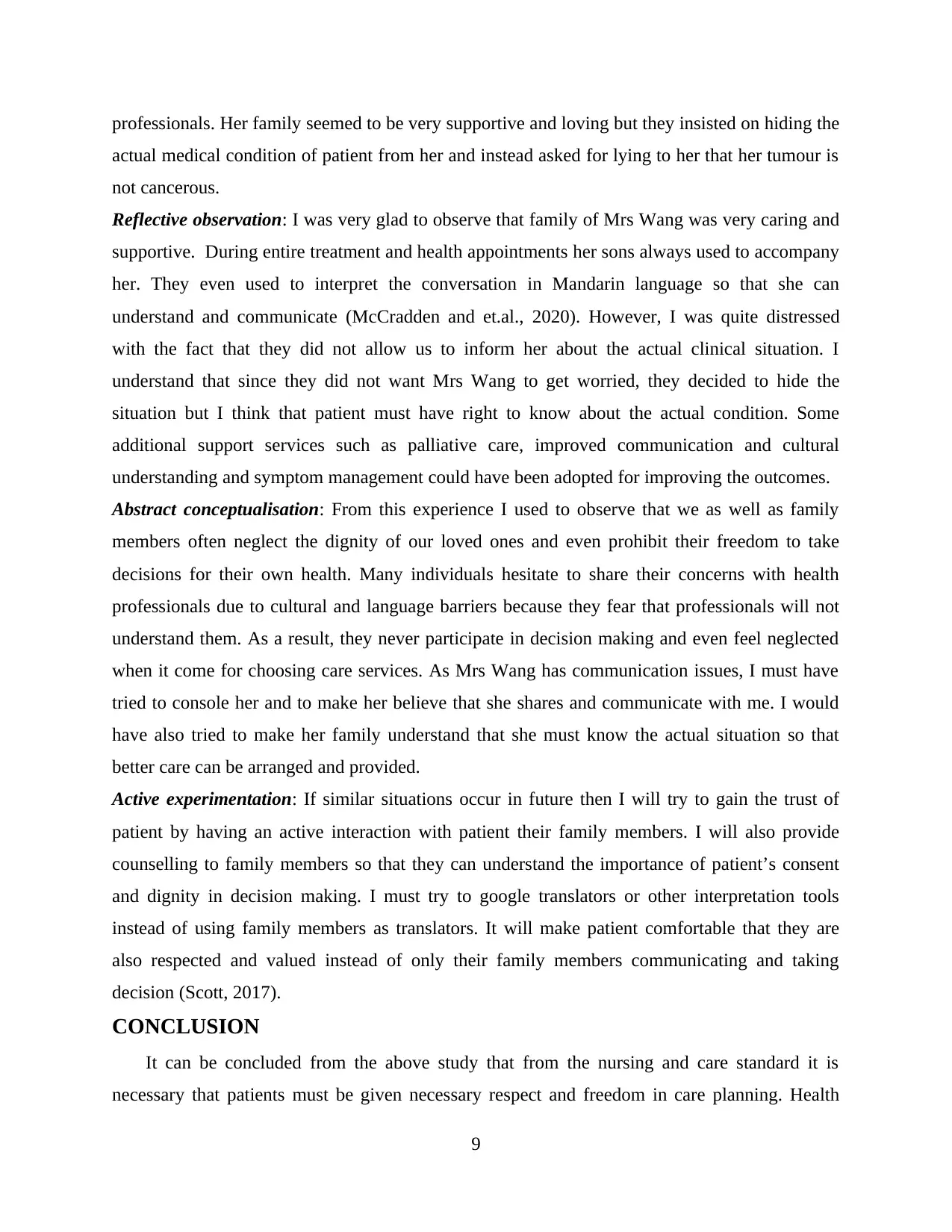
professionals. Her family seemed to be very supportive and loving but they insisted on hiding the
actual medical condition of patient from her and instead asked for lying to her that her tumour is
not cancerous.
Reflective observation: I was very glad to observe that family of Mrs Wang was very caring and
supportive. During entire treatment and health appointments her sons always used to accompany
her. They even used to interpret the conversation in Mandarin language so that she can
understand and communicate (McCradden and et.al., 2020). However, I was quite distressed
with the fact that they did not allow us to inform her about the actual clinical situation. I
understand that since they did not want Mrs Wang to get worried, they decided to hide the
situation but I think that patient must have right to know about the actual condition. Some
additional support services such as palliative care, improved communication and cultural
understanding and symptom management could have been adopted for improving the outcomes.
Abstract conceptualisation: From this experience I used to observe that we as well as family
members often neglect the dignity of our loved ones and even prohibit their freedom to take
decisions for their own health. Many individuals hesitate to share their concerns with health
professionals due to cultural and language barriers because they fear that professionals will not
understand them. As a result, they never participate in decision making and even feel neglected
when it come for choosing care services. As Mrs Wang has communication issues, I must have
tried to console her and to make her believe that she shares and communicate with me. I would
have also tried to make her family understand that she must know the actual situation so that
better care can be arranged and provided.
Active experimentation: If similar situations occur in future then I will try to gain the trust of
patient by having an active interaction with patient their family members. I will also provide
counselling to family members so that they can understand the importance of patient’s consent
and dignity in decision making. I must try to google translators or other interpretation tools
instead of using family members as translators. It will make patient comfortable that they are
also respected and valued instead of only their family members communicating and taking
decision (Scott, 2017).
CONCLUSION
It can be concluded from the above study that from the nursing and care standard it is
necessary that patients must be given necessary respect and freedom in care planning. Health
9
actual medical condition of patient from her and instead asked for lying to her that her tumour is
not cancerous.
Reflective observation: I was very glad to observe that family of Mrs Wang was very caring and
supportive. During entire treatment and health appointments her sons always used to accompany
her. They even used to interpret the conversation in Mandarin language so that she can
understand and communicate (McCradden and et.al., 2020). However, I was quite distressed
with the fact that they did not allow us to inform her about the actual clinical situation. I
understand that since they did not want Mrs Wang to get worried, they decided to hide the
situation but I think that patient must have right to know about the actual condition. Some
additional support services such as palliative care, improved communication and cultural
understanding and symptom management could have been adopted for improving the outcomes.
Abstract conceptualisation: From this experience I used to observe that we as well as family
members often neglect the dignity of our loved ones and even prohibit their freedom to take
decisions for their own health. Many individuals hesitate to share their concerns with health
professionals due to cultural and language barriers because they fear that professionals will not
understand them. As a result, they never participate in decision making and even feel neglected
when it come for choosing care services. As Mrs Wang has communication issues, I must have
tried to console her and to make her believe that she shares and communicate with me. I would
have also tried to make her family understand that she must know the actual situation so that
better care can be arranged and provided.
Active experimentation: If similar situations occur in future then I will try to gain the trust of
patient by having an active interaction with patient their family members. I will also provide
counselling to family members so that they can understand the importance of patient’s consent
and dignity in decision making. I must try to google translators or other interpretation tools
instead of using family members as translators. It will make patient comfortable that they are
also respected and valued instead of only their family members communicating and taking
decision (Scott, 2017).
CONCLUSION
It can be concluded from the above study that from the nursing and care standard it is
necessary that patients must be given necessary respect and freedom in care planning. Health
9
⊘ This is a preview!⊘
Do you want full access?
Subscribe today to unlock all pages.

Trusted by 1+ million students worldwide

professionals must use communication approaches and skills so that patient does not feel
disrespected and their clinical outcomes can be improved.
10
disrespected and their clinical outcomes can be improved.
10
Paraphrase This Document
Need a fresh take? Get an instant paraphrase of this document with our AI Paraphraser
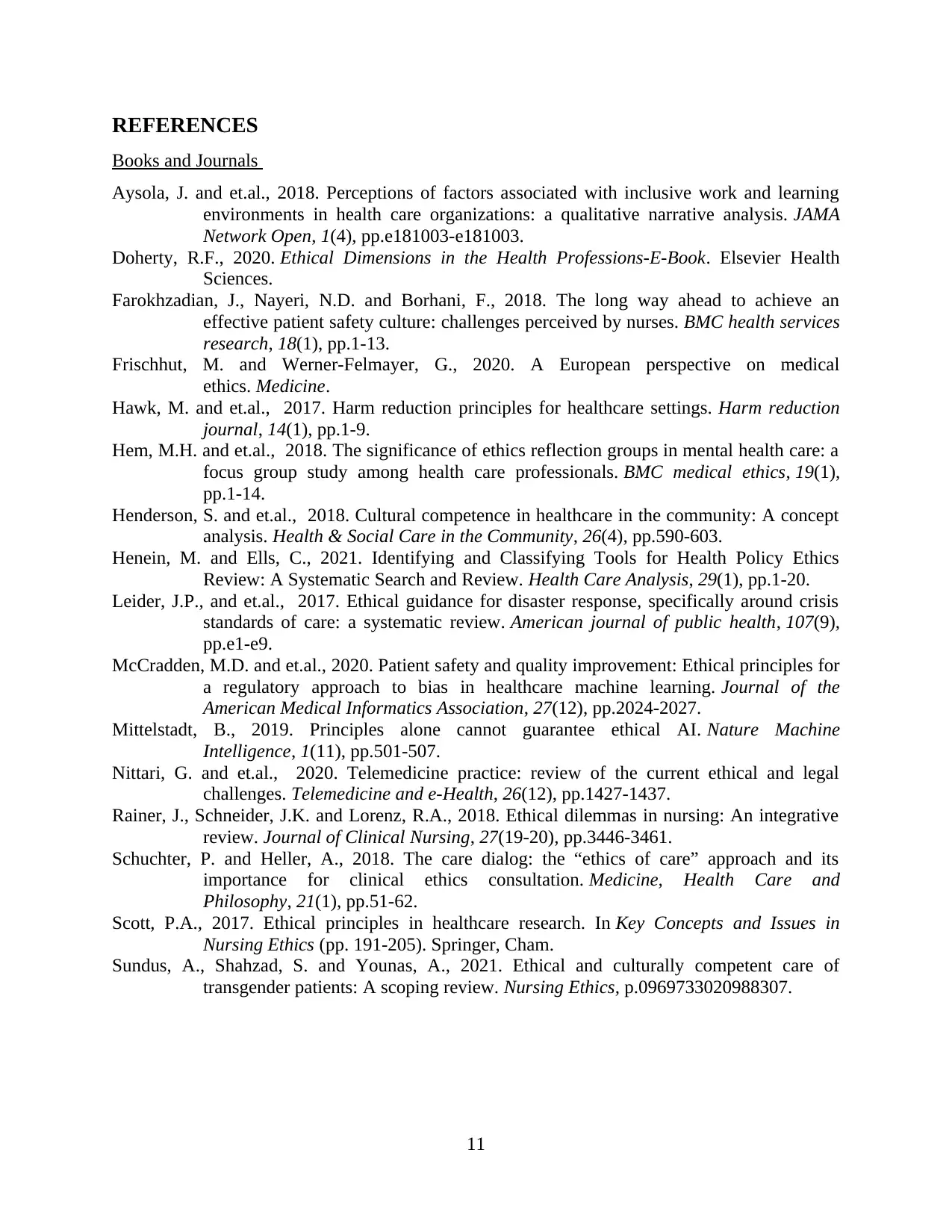
REFERENCES
Books and Journals
Aysola, J. and et.al., 2018. Perceptions of factors associated with inclusive work and learning
environments in health care organizations: a qualitative narrative analysis. JAMA
Network Open, 1(4), pp.e181003-e181003.
Doherty, R.F., 2020. Ethical Dimensions in the Health Professions-E-Book. Elsevier Health
Sciences.
Farokhzadian, J., Nayeri, N.D. and Borhani, F., 2018. The long way ahead to achieve an
effective patient safety culture: challenges perceived by nurses. BMC health services
research, 18(1), pp.1-13.
Frischhut, M. and Werner-Felmayer, G., 2020. A European perspective on medical
ethics. Medicine.
Hawk, M. and et.al., 2017. Harm reduction principles for healthcare settings. Harm reduction
journal, 14(1), pp.1-9.
Hem, M.H. and et.al., 2018. The significance of ethics reflection groups in mental health care: a
focus group study among health care professionals. BMC medical ethics, 19(1),
pp.1-14.
Henderson, S. and et.al., 2018. Cultural competence in healthcare in the community: A concept
analysis. Health & Social Care in the Community, 26(4), pp.590-603.
Henein, M. and Ells, C., 2021. Identifying and Classifying Tools for Health Policy Ethics
Review: A Systematic Search and Review. Health Care Analysis, 29(1), pp.1-20.
Leider, J.P., and et.al., 2017. Ethical guidance for disaster response, specifically around crisis
standards of care: a systematic review. American journal of public health, 107(9),
pp.e1-e9.
McCradden, M.D. and et.al., 2020. Patient safety and quality improvement: Ethical principles for
a regulatory approach to bias in healthcare machine learning. Journal of the
American Medical Informatics Association, 27(12), pp.2024-2027.
Mittelstadt, B., 2019. Principles alone cannot guarantee ethical AI. Nature Machine
Intelligence, 1(11), pp.501-507.
Nittari, G. and et.al., 2020. Telemedicine practice: review of the current ethical and legal
challenges. Telemedicine and e-Health, 26(12), pp.1427-1437.
Rainer, J., Schneider, J.K. and Lorenz, R.A., 2018. Ethical dilemmas in nursing: An integrative
review. Journal of Clinical Nursing, 27(19-20), pp.3446-3461.
Schuchter, P. and Heller, A., 2018. The care dialog: the “ethics of care” approach and its
importance for clinical ethics consultation. Medicine, Health Care and
Philosophy, 21(1), pp.51-62.
Scott, P.A., 2017. Ethical principles in healthcare research. In Key Concepts and Issues in
Nursing Ethics (pp. 191-205). Springer, Cham.
Sundus, A., Shahzad, S. and Younas, A., 2021. Ethical and culturally competent care of
transgender patients: A scoping review. Nursing Ethics, p.0969733020988307.
11
Books and Journals
Aysola, J. and et.al., 2018. Perceptions of factors associated with inclusive work and learning
environments in health care organizations: a qualitative narrative analysis. JAMA
Network Open, 1(4), pp.e181003-e181003.
Doherty, R.F., 2020. Ethical Dimensions in the Health Professions-E-Book. Elsevier Health
Sciences.
Farokhzadian, J., Nayeri, N.D. and Borhani, F., 2018. The long way ahead to achieve an
effective patient safety culture: challenges perceived by nurses. BMC health services
research, 18(1), pp.1-13.
Frischhut, M. and Werner-Felmayer, G., 2020. A European perspective on medical
ethics. Medicine.
Hawk, M. and et.al., 2017. Harm reduction principles for healthcare settings. Harm reduction
journal, 14(1), pp.1-9.
Hem, M.H. and et.al., 2018. The significance of ethics reflection groups in mental health care: a
focus group study among health care professionals. BMC medical ethics, 19(1),
pp.1-14.
Henderson, S. and et.al., 2018. Cultural competence in healthcare in the community: A concept
analysis. Health & Social Care in the Community, 26(4), pp.590-603.
Henein, M. and Ells, C., 2021. Identifying and Classifying Tools for Health Policy Ethics
Review: A Systematic Search and Review. Health Care Analysis, 29(1), pp.1-20.
Leider, J.P., and et.al., 2017. Ethical guidance for disaster response, specifically around crisis
standards of care: a systematic review. American journal of public health, 107(9),
pp.e1-e9.
McCradden, M.D. and et.al., 2020. Patient safety and quality improvement: Ethical principles for
a regulatory approach to bias in healthcare machine learning. Journal of the
American Medical Informatics Association, 27(12), pp.2024-2027.
Mittelstadt, B., 2019. Principles alone cannot guarantee ethical AI. Nature Machine
Intelligence, 1(11), pp.501-507.
Nittari, G. and et.al., 2020. Telemedicine practice: review of the current ethical and legal
challenges. Telemedicine and e-Health, 26(12), pp.1427-1437.
Rainer, J., Schneider, J.K. and Lorenz, R.A., 2018. Ethical dilemmas in nursing: An integrative
review. Journal of Clinical Nursing, 27(19-20), pp.3446-3461.
Schuchter, P. and Heller, A., 2018. The care dialog: the “ethics of care” approach and its
importance for clinical ethics consultation. Medicine, Health Care and
Philosophy, 21(1), pp.51-62.
Scott, P.A., 2017. Ethical principles in healthcare research. In Key Concepts and Issues in
Nursing Ethics (pp. 191-205). Springer, Cham.
Sundus, A., Shahzad, S. and Younas, A., 2021. Ethical and culturally competent care of
transgender patients: A scoping review. Nursing Ethics, p.0969733020988307.
11
1 out of 11
Related Documents
Your All-in-One AI-Powered Toolkit for Academic Success.
+13062052269
info@desklib.com
Available 24*7 on WhatsApp / Email
![[object Object]](/_next/static/media/star-bottom.7253800d.svg)
Unlock your academic potential
Copyright © 2020–2026 A2Z Services. All Rights Reserved. Developed and managed by ZUCOL.




